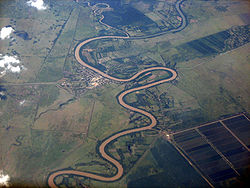Meander - Simple English Wikipedia, the free encyclopedia



A meander is a curve in a river. Meanders form a snake-like pattern as the river flows across a fairly flat valley floor. The position of the curves changes over time. Meanders were named for a river in Anatolia.
A river rarely flows in a straight line: it bends around because it drops sediment where it flows most slowly. There are areas of slower and faster water movement. The river flows faster on the outside of a curve, and the fast water erodes the outside bends of a river channel by hydraulic action and abrasion. This forms a river cliff. The river flows more slowly on the inside of the river beach. The slower water drops sediment.
Continuous erosion on the outer bank and deposition on the inner bank will expand the bend in the river. This is called a meander. Over time, meanders become larger and more visible.
Eventually meanders turn into oxbow lakes when two outside bends erode together making a shorter route for the water.
Related pages[change | change source]


 French
French Deutsch
Deutsch